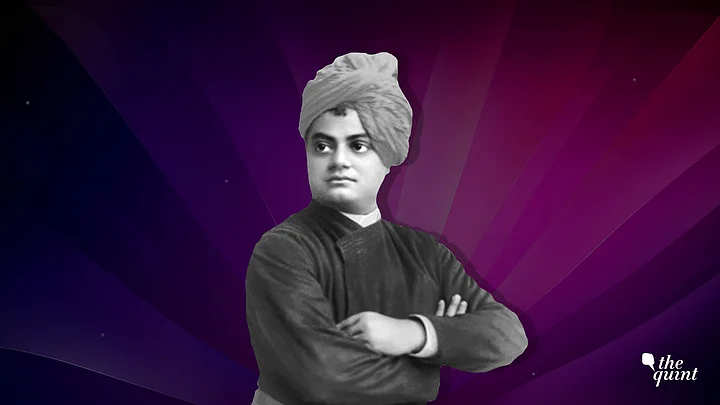(On the birth anniversary of Swami Vivekananda, The Quint is republishing this article from its archives, originally published on 3 July 2018.)
Swami Vivekananda ranks among the highest in the pantheon of distinguished children of Mother India. His charismatic personality electrified audiences, and his organisational skills were unmatched. His influence on other freedom fighters – from Yogi Aurobindo to Netaji Subhas C Bose – is just as incomparable.
Gurudev Rabindranath Tagore called Vivekananda a genius, and the legendary scientist Jagdish Chandra Bose acknowledged that he was inspired by the monk, who galvanised millions of his compatriots.
It was not only fellow Indians who came under Vivekananda’s spell. He was arguably the first and most successful brand ambassador of a resurgent India in the USA, spreading his teaching far and wide.
An Unorthodox Monk
Vivekananda strove to combat superstition, to get rid of the deadwood of ritual that was stifling those who followed the Hindu way of life, and left behind a large body of written work, reinterpreting the Vedanta for modern times.
Vivekananda’s ways were unorthodox. The cigar-smoking monk had no problem with those who ate meat. He freely borrowed from whatever he felt was the best practice in other religions. His favourite word was ‘strength’ – he exhorted fellow Indians to be strong in body and spirit. He was compassionate and liberal in his outlook. For him, there was no religion greater than serving the wretched – the poor, the ailing, and the oppressed.
For decades, the Left-leaning historians tried to airbrush anyone who didn’t fit their agenda in the history of Indian regeneration and freedom struggle.
The ochre robes of a Hindu monk have become a red rag for these scholars who bore the heavy Cross of Secularism. Vivekananda became a symbol of what was termed Muscular Hinduism – strident and aggressive. They failed to see that Vivekananda continued to mesmerise the young and old across the length and breadth of India, long after his death.
Calendar art bears testimony to this – the undisputed Trimurti of Swami Vivekananda, Shaheed Bhagat Singh and Netaji Subhash Bose continue to adorn the walls of many homes even today. Those who are agitated today about the appropriation of Vivekananda by the Sangh Parivar and are desperate to reclaim him, must ask themselves this question – why and how had they remained blind to the multifaceted contributions of this exceptional Indian?
No One Can Monopolise Vivekananda
Today the Congress and other parties in opposition are desperately trying to get a foothold in the hearts and minds of voters who proudly proclaim their adherence to ‘Sanatana Dharma’. Simultaneously, strategists are working overtime on how best to market ‘Soft Hinduism’ to counter the machinations of the Hindutva Brigade. In the short term, this opportunism may bring some dividends, but it is bound to eventually boomerang.
What we all need to understand is that the legacy of Vivekananda is not something that can be partitioned and shared by the ‘Divided Hindu Family’. He comes in a well-integrated package.
The sanyasi believed in service before self, and couldn’t stand hypocrisy. He examined the past with ruthless detachment and tested everything with razor-sharp intelligence. He was indeed a pioneering moderniser. At the same time, one can not surgically separate the social reformer from the spiritual seeker. Like Adi Shankaracharya, whose life and outlook Vivekananda seemed to have mirrored in many ways – the disciple of the mystic Ramkrishna Paramhans – had something to offer to each person.
Swami Vivekananda preached not only karma yoga (selfless action) but also emphasized the ethos of Bhakti and Jnana (devotion and intellectual quest). This apart, Vivekananda had an impish sense of humour, and would have surely been very amused by the bickering among his blind followers, and detractors.
There is no dearth of trendy godmen with tailor-made personalities to suit changing times. But Vivekananda doesn’t require an image makeover. He continues to be the medium through which the message of perennial wisdom is transmitted.
It would be foolish to suggest or believe that he can be owned and monopolised by any partisan / sectarian group. Indians and foreigners alike will continue to be enriched by his teachings, and Vivekananda will remain a living presence above political skirmishes.
Therefore, apprehensions about the misappropriation of Vivekananda are totally misplaced. One doesn’t even have to be a believer – far less a Hindu – to admire Vivekananda, and acknowledge his seminal contribution to the making of modern India.
(Padma Shri awardee Professor Pushpesh Pant is a noted Indian academic, food critic and historian. He tweets @PushpeshPant. This is an opinion piece. The views expressed are the author’s own. The Quint neither endorses nor is responsible for them.)
